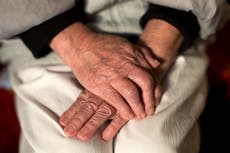Britons drank more but smoked less in lockdown, study says
Number of people feeling psychological distress increased to almost a third during first month of restrictions

Britons drank more alcohol but smoked fewer cigarettes during lockdown, research suggests.
The proportion of people who drank four or more times a week increased along with binge drinking, according to a study based on data from more than 27,000 people.
It also found the number of people feeling psychological distress increased to almost a third during the first month of lockdown, with women and younger people particularly affected.
The researchers suggest effective measures are needed to mitigate the adverse impacts on health such as increased drinking and psychological distress during lockdowns.
Dr Claire Niedzwiedz, from the University of Glasgow’s Institute of Health and Wellbeing, said: "Understanding the health impacts of lockdown is important, as further periods of physical distancing are likely to be necessary in many countries for some time, especially as the risk of further waves of infection remains.
The study, published in the Journal of Epidemiology & Community Health and led by the University of Glasgow, found binge drinking increased from 10.8 per cent in 2017-19 to 16.2 per cent in April 2020, while the proportion of people who reported drinking four or more times a week rose from 13.7 per cent to 22 per cent.,
Binge-drinking remained stable in the youngest age group, but increased in those aged 25 and over and rose more among women, white ethnic groups and those with degree-level education.
However, the proportion of people who reported consuming five or more drinks during a typical day when drinking decreased from 13.6 per cent to 5.6 per cent during lockdown, most evidently in the youngest age group.
Researchers found cigarette smoking also decreased during lockdown, from 15.1 per cent in 2017-19 to 12.1 per cent in April this year, with the decrease most apparent in the younger age groups and among men.
The study found psychological distress increased over time from 19.4 per cent in 2017-19 to 30.6 per cent in April this year during the lockdown, which started on 23 March.
This increase was most pronounced among people aged under 45 years and among women, where psychological distress rose from 23 per cent to 36.8 per cent.
Asian minority ethnic groups also experienced a large increase in psychological distress, from 18.7 per cent to 34.9 per cent over the same period.
Researchers used pre-pandemic data from the UK Household Longitudinal Study, a nationally representative longitudinal household panel study based on a sample of UK households, and collected an additional wave of data via an online survey during lockdown between 24 and 30 April 2020.
Additional reporting by Press Association
Join our commenting forum
Join thought-provoking conversations, follow other Independent readers and see their replies
Comments
Bookmark popover
Removed from bookmarks